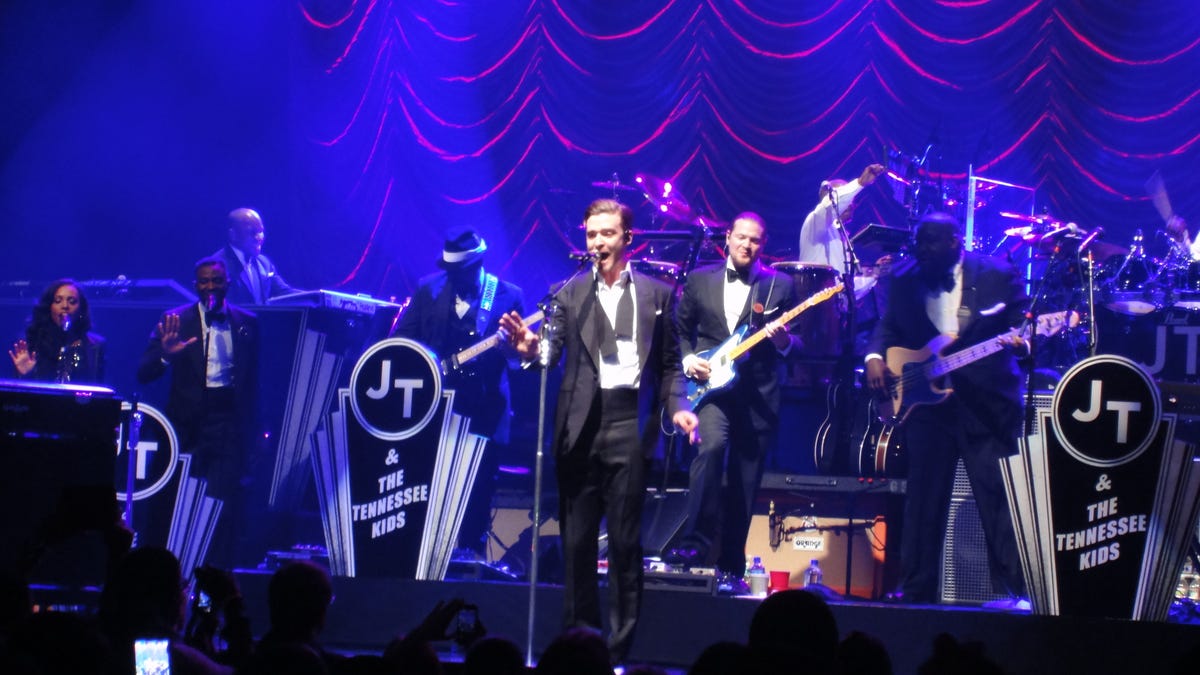Justin Timberlake blesses iTunes Radio; Pandora should worry
One analyst notes that Justin Timberlake's sneak-peek stream of his new album on iTunes Radio underscores how Pandora is underestimating the threat of its new competitor.

The man in the suit and tie is getting chummier with iTunes, streaming the sequel to his "20/20 Experience" hit album on Apple's new iTunes Radio exclusively ahead of its release.
And that should be making Pandora uneasy, one analyst says.
Justin Timberlake's forthcoming album "The 20/20 Experience - 2 of 2" is streaming exclusively on iTunes Radio ahead of release Monday. In addition to giving listeners of Apple's new Internet radio service early access to tracks from the album that play one after another, Timberlake "hosts" the program with short clips in between songs giving anecdotes about the album and touting iTunes Radio as the only place to hear the "20/20 radio experience." The first of Timberlake's pair of albums debuted at the top of the Billboard 200 chart in March.
BTIG Research analyst Rich Greenfield noted that these kinds of exclusive deals are one way that iTunes Radio can drive growth once the initial excitement over the product dies down. iTunes Radio rounded up more than 11 million unique listeners in the first five days of its life, but the question remained whether -- and how -- Apple can sustain that kind of adoption.
Apple's strategy of sealing direct deals with labels paved the way for it to hook this kind of exclusive content. And Apple's strategy to deeply integrate digital-download purchasing into its radio product paves the way for labels to lean toward iTunes Radio for more exclusive content deals like this.
Timberlake -- who is still working to resuscitate Myspace, which he acquired in 2011 -- has had close ties with iTunes and Apple for a while. Earlier this year, he agreed to headline the iTunes Festival in London, which features a new artist every night this month and is streamed live or on-demand for iOS users. Timberlake's performance is slated for Sunday.
"Apple appears to be using its strong music label relationships and direct label deals to gain access to unique content for iTunes Radio, which is simply not available to services that use compulsory music licenses (such as Pandora)," Greenfield, who rates Pandora as a stock he recommends investors sell, said in a note. "We continue to believe Pandora's management team and investors are underestimating the risk of competition."
Pandora pays licensing rates determined by federal statute, which means it lacks direct relationships with the labels and is crimped by rules that prevent it from playing songs by a specific artist on demand or playing songs by the same artist one after another.
Several times, the Internet's biggest radio provider has said that Apple's entrance into the realm would help Pandora more than hurt it by hastening the migration to Web-based radio to from broadcast.
Pandora isn't a stranger to exclusive content, though. It set up an exclusive-content station called Pandora Premieres in May as a partnership with more than 50 record companies to promote and digitally market two to four albums a week. The artists span a range of music genres and include both emerging and established artists, and the channel has more than a million people have added the station since its launch.
But so far, Pandora isn't interested in switching its model toward direct deals away from the statutory license, even though it not only limits what and how it can play it songs but also makes international expansion tricky.
Pandora currently operates in the US, Australia and New Zealand. Spotify, an on-demand music service that went the route of direct label deals like Apple did, recently expanded to four more countries, bringing its total footprint to 32. iTunes Radio has available strictly in the U.S. initially, but Apple plans to roll it out internationally later on -- and Apple has a base of at least 575 million iTunes customers worldwide.
Earlier this week at an investor conference in New York, Pandora founder and strategy chief Tim Westergren said the company wasn't dead set against the idea of direct deals but also didn't see how they are attractive.
He noted that direct deals can run counter to Pandora's mission of feeding its listeners music similar to what they like regardless of its popularity. "A distinctive competence of Pandora is playing music you've never heard before, much of which comes from...artists that are not on established labels. Folks for whom it would be very difficult to go get direct licenses from," he said.
"Direct deals are not something that we're allergic to, it's just there's been no history yet in this industry of people striking reasonable direct deals," he said. "We're constantly monitoring that to see if it changes."
But with iTunes Radio's snagging sweetheart exclusives like Timberlake's new album sure to bring in new listeners, direct deals certainly have a little more shine to them.

